|
Guelph's Scottish
Collection is one of the finest in the world. Interest in building a
Scottish and Scottish-Canadian collection began shortly after the creation
of the History Department in 1965 when the University of Guelph was
established. This initiative was soon taken up by other departments and
led to the formation of an interdepartmental Committee on Scottish
Studies, responsible for graduate programs at the master's and doctoral
levels.
In addition to regular library funds spent on the development of resource
materials in this field, faculty and the library have been fortunate in
securing grants from private and government sources for the acquisition of
Scottish items. There have also been a number of important and valuable
donations. Some of these have been instigated by a dedicated and active
group of graduate students who have managed to locate letters and
documents relating to Scotland and Scottish settlement in this area.
Others have been donated by friends of the library who value the
importance of having a secure repository for these unique historical
documents. The library is always interested in aquiring any material, such
as old family letters, that may contain information on conditions in
Scotland or Scottish pioneer life in Canada. Before 1990, the library also
received Social Sciences and Humanities Research Council grants to expand
its Scottish holdings.
Users of the collection should be advised that Scottish materials are
located throughout the library depending on subject classification or
form.
Here is an intro written by
Colin Gibson, A Mercury Staff Writer....
The Scottish and
Scottish-Canadian collection housed in the University of Guelph archives -
and also spread throughout other floors of McLaughlin Library - is
described as "one of the finest in the world and undoubtedly the best in
North America."
It combines a Scottish and
Scottish-Canadian wealth of material including regional history, that not
only cuts a wide tartan swath through the fields of academia, but also
through the fertile fields of human interest in historical matters.
Started in 1965 -
coincident with the establishment of the university's history department
- the Scottish collection was initiated as a special project under the
guiding hand of the history department's first chairman, Stanford Reid.
The initial undertaking
took on a life of its own and led to the establishment of an
interdepartmental committee on Scottish studies, responsible for graduate
programs at the masters and doctoral levels.
The city of Guelph's strong
Scottish ties - from its founding to the present - has resulted in the
accumulation of approximately 100,000 records including rare books,
pamphlets, maps, journals and various and sundry other memorabilia.
Guelph was founded as a
planned town in 1827 by John Galt, a Scottish novelist who was also a
superindendent of the Canada Company.
The Canada Company, based
in London, England, used the concept of planning communities in advance of
general settlement in order to stimulate sales of agricultural lands.
It's recorded that Galt
picked the name to honour Britain's royal family, the Hanoverians, who
were descended from the Guelphs, one of the great political factions in
medieval Germany and Italy.
Regional history comes
alive in the Scottish-Canadian collection, concentrating on Wellington
County.
The Guelph
Allan-Higinbotham Papers manuscript series is joined by the Connon
Collection of early photographs of Elora and the Gilkison-Fraser
Collection.
Rare editions of the works
of John Galt have found safe haven, to complement manuscript holdings such
as the Lizars Collection consisting of correspondance, legal documents and
the library of the pioneer family related to Galt by marriage.
The Goodwin-Hains
Collection contains information on Upper Cabada, including early crown
land grants, items relating to William Lyon Mackenzie and papers of Samuel
Street, a Niagara settler.
Dedicated individuals have
contributed to the excellence of the university's Scottish collection, none
more so than the present chairman of the Scottish studies program,
Professor Ted Cowan.
Cowan arrived at the Guelph
university campus in 1979, after having spent 13 years teaching at the
University of Edinburgh.
The lure of the Scottish
collection played a big part in Cowan venturing overseas and his tireless
work in promoting the Scottish studies program and the Scottish
collection, through speaking engagements and other activities, has helped
enormously in enhancing its reputation.
Another feather in the
collection's cap was added in 1987 with the arrival of professor Catherine
Kerrigan, an internationally recognized author and accepted expert on
Scottish culture and literature.
Kerrigan has had five books
published and her latest effort, An Anthology of Scottish Women Poets, has
been nominated for the prestigious Saltre Award.
This award, issued
annually, is presented to an outstanding literary contribution to Scottish
culture. The Saltire Society was founded in Scotland in the 18th century
to promote Scottish culture.
Kerrigan, who has presented
papers in Germany, France, England, Ireland and the United States has been
invited to Oxford University next year as a guest lecturer.
She was born in Glasgow and
came to Canada in 1960. She did undergraduate work and received her
Masters from the University of Toronto and went on to obtain her Phd from
the University of Edinburgh.
Her interest in Scottish
literature was piqued by the works of poet Hugh MacDiarmid, a strong
Scottish nationalist whose initial works were written in distinct Scots -
the language of the common man.
In concert with University
of Guelph professor emeritus, Elizabeth Waterson (who along with professor
Mary Rubio, coordinated the archives' L.M. Montgomery collection) Kerrigan
is working to add to the Scottish collection's literature sections.
The Scottish collection
provides books on Scottish history, genealogy, clan histories, travel,
politics and economics as well as extensive holdings of Scottish
historical and antiquarian society publications.
The rare book room houses a
valuable Jacobite Collection - a series of pamphlets on the Disruption.
Scottish manuscripts
include the Ewen-Grahame Papers (1723-1892), an Aberdeen Collection and
the Campbell of Monzie Papers which contain the oldest piece in the
manuscript collections, a document dated 1416.
The Foulis Press
Collection, acquired in July of 1990, contains 330 titles, or fully 60 per
cent of the total output of a printing publishing house that operated in
Scotland from 1740 until exactly 1800.
An extension of the
Scottish studies program, a student exchange opportunity, has been in
effect with the University of Aberdeen for five years. Another student
exchange program has been initiated with Strathclyde University in
Glasgow.
So here is how you find the
Scottish Collection office...
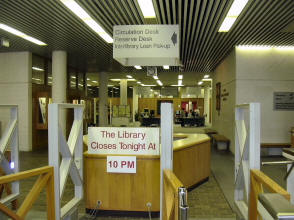
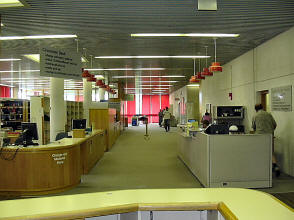
You go through the gates and then turn left
along this corridor towards the exit sign at the end. I might add if you
go straight on then when you get to the end of that corridor you turn
right and that gets you to the coffee area :-)
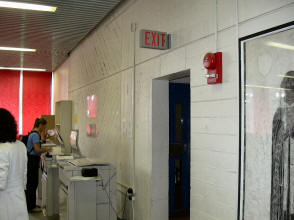
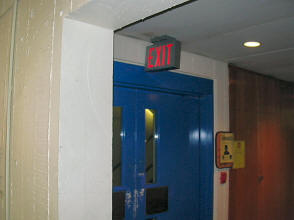
As you go through this exit door you can see
another exit door which you go through
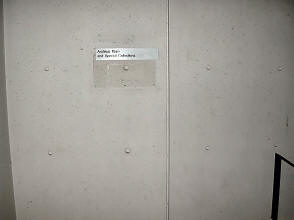
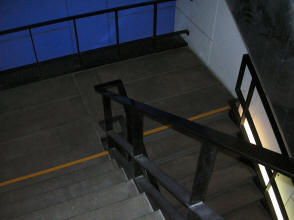
You'll see the wee sign saying "Archival, Rare
and Special Collections" and then you head down one flight of stairs

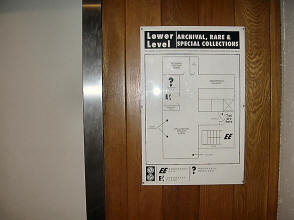
It does say "Basement" when you get there and
then you turn left through this door
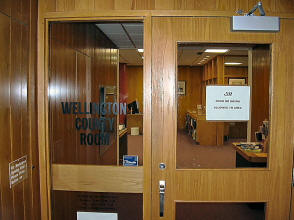
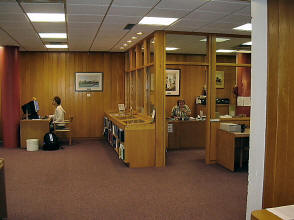
And then into the Wellington County Room and
there you will see the friendly library staff that will guide you from
there :-)
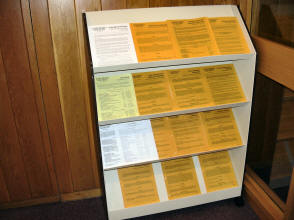
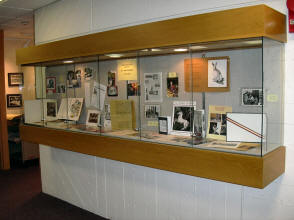
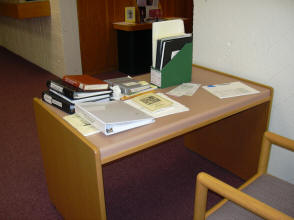
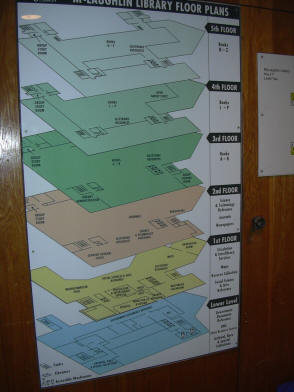
And here was the desk I used while I was here.
They library staff looked out lots of reference material for me as you can
see on the desk. It was a great help and got me off to a flying
start. Also the picture on the right shows the floor plan of the library
Here are a few pictures of
the library to give you a wee introduction to it...
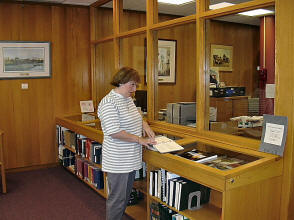
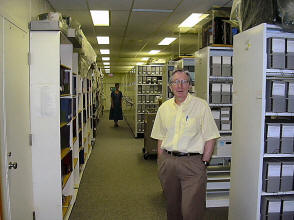
The staff at the library have prepared a
welcome pack of material to help me get started and
Lorne Bruce, Head,
Archival and Special Collections University of Guelph Library, gives me a quick tour
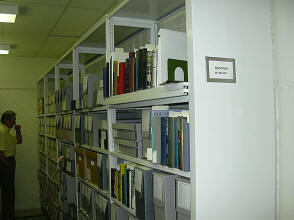
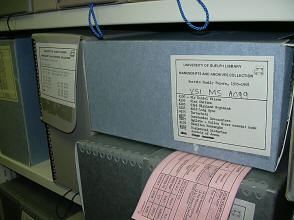
First some of the Scottish collection
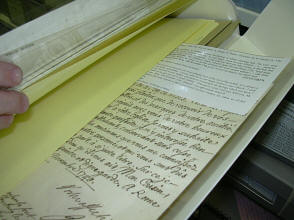
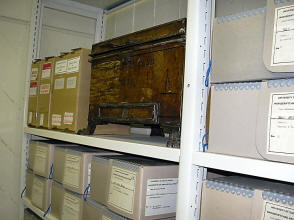
And then it's into the rare book and document
collection
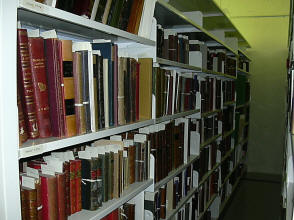
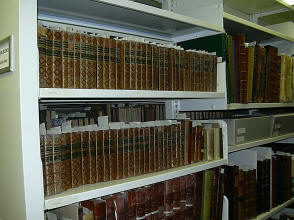
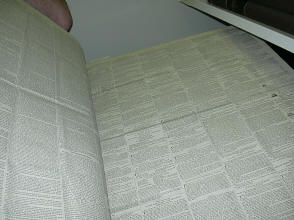
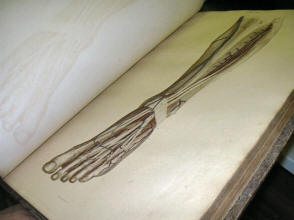
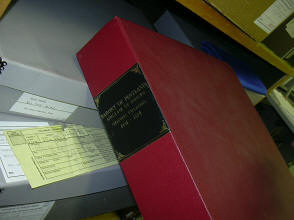
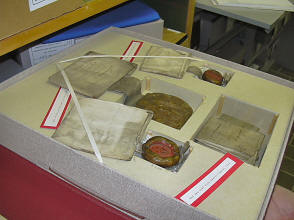
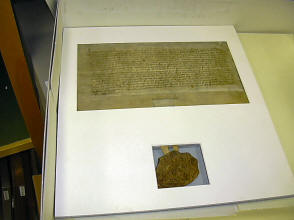
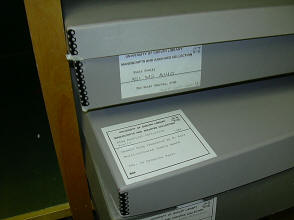
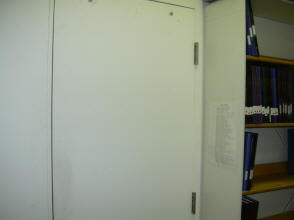
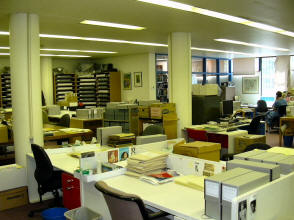
In the rare book and document department you
enter through a locked plain white door. And as you will have seen above
there are some remarkable finds to be found! On the right is the library
office where they do all the cataloging and admin work
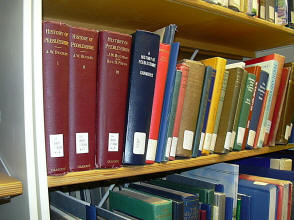
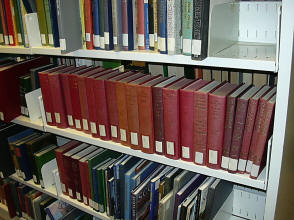
And then it's up to the third floor where you
can find Scottish history and also a clan and family section
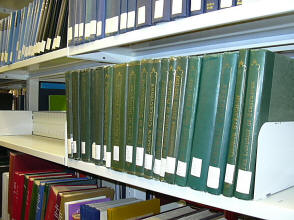
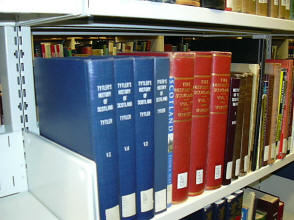
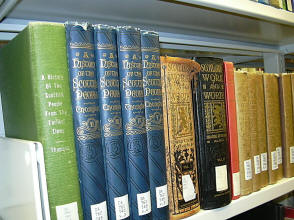
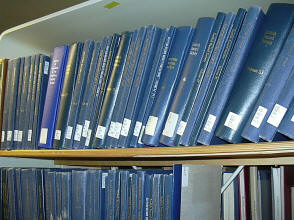
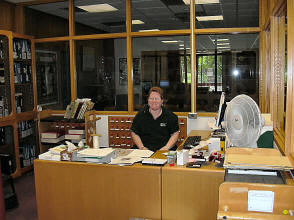
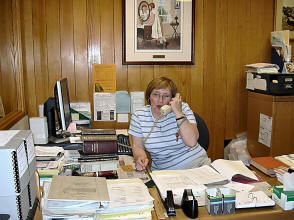
And it's amazing how many of the library staff
are Scots or of Scots descent.
On the left is Darlene Wiltsie and on the right Ellen Morrison
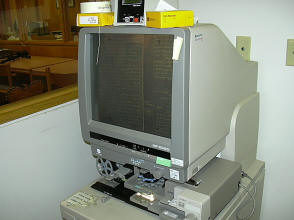
I intend to profile the
library collection in some depth during the next couple of weeks so this
is just a wee taster of what is in store.
I might add that my wee introduction to the
library seems to have had some benefits... got in an email from Keith
Dewar...
Hi Alastair:
I was very excited to read your write-up
about the Library at Guelph U. (Campbell of Monzie Papers) My ancestors
had lived on this estate, believed to have been smithy's at Camserney.
Donald Dewar (Deor) during the 1600's and 1700's. I have been looking
for these papers and was at the castle last summer trying to trace them,
but nobody knew where they were. Apparantly, everything at the castle
was auctioned off about 1910, and boxes and boxes of these papers, were
sold off for about a pound per box load. I plan to go up to the
University next week, and try and trace my ancestors. I live near
Niagara Falls, about an hours drive.
And so great to know I've been of some
help to someone :-)
I might also add that I had lunch with
Lynn Campbell, Manager, Library Development and Public Relations and we
hope to bring you a monthly news bulletin in the months ahead keeping
you up to date with happenings at the library... and she took me to a
great curry shop for lunch! What a Gal ! :-)
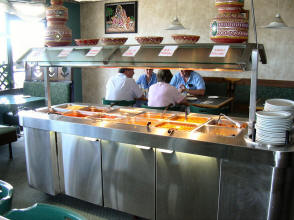
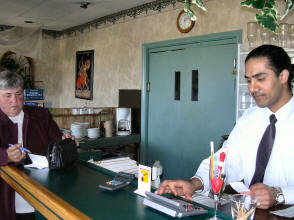
And Lynn's paying the bill and her a
Campbell at that [grin]
|
